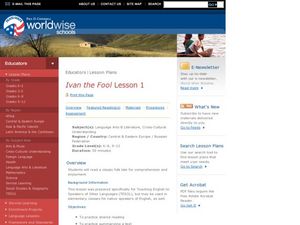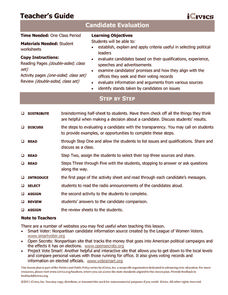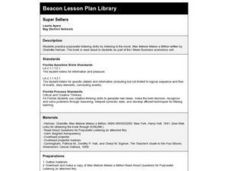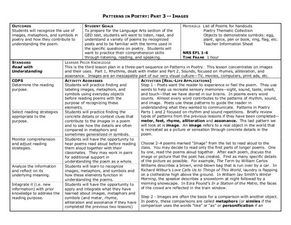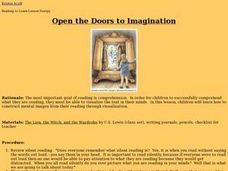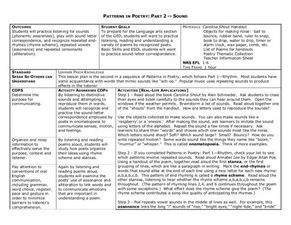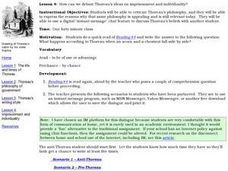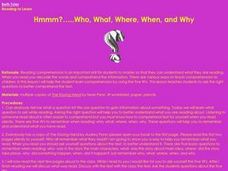Curated OER
Lewis and Clark for Grades PreK-2
Young scholars read the "The Journey Begins" article and discuss why people want to discover new lands and why it is still exciting today. They are introduced to the idea that Lewis and Clark sent back discoveries to President Thomas...
Smithsonian Institution
Reflections of the Sea
Students, after listening to a selection of Gulliver's Travels, complete a worksheet about basic terms associated with boats, ships, and sailing. They create flag after researching semaphore flagging systems.
Curated OER
When the Fly Flew In
Explore visual and verbal recall and sequencing with your youngsters. Start by reading a story and completing a worksheet after listening to the story. They work to identify the main idea and supporting details. The worksheet is included...
Curated OER
Ivan the Fool
Students read a classic folk tale, Ivan the Fool, and complete shared reading activities. In this reading activities lesson, students complete a shared reading of the folk tale and write a summary for the story.
Houghton Mifflin Harcourt
Nature: Friend and Foe: Challenge Activities (Theme 6)
The teacher doesn't always have to be the expert in the classroom. The first in a series of three supplementary activities Nature: Friend or Foe uses hands-on research tasks and projects to enhance readers' understanding of non-fiction...
Houghton Mifflin Harcourt
Silly Stories: English Language Development Lessons (Theme 1)
ESL/ELD learners are provided extra support with the Houghton Mifflin Harcourt thematic units on silly stories by this packet of activities, exercises, and practice sets.
iCivics
Candidate Evaluation
How can we decide between candidates on election day? After contemplating various issues and qualities, your learners will go through a step-by-step process of researching and evaluating sample candidates and determining their...
EngageNY
Editing Sentences and Creating Visual and Multimedia Displays for a Presentation
Let's get visual. Pupils plan visual displays to accompany their upcoming opinion speech presentations. Additionally, they practice editing sentences for clarity before revising their speech drafts.
Houghton Mifflin Harcourt
Incredible Stories: Extra Support Lessons (Theme 3)
The materials in this 40-page packet are designed for learners who need extra support in order to understand the concepts in a thematic unit on fantasy and realism.
Curated OER
Patterns in Poetry: Part I--Rhythm
Young scholars explore patterns in poetry. In this language arts activity, students discuss rhythm in poetry. Young scholars read poems and discuss the rhythm of each poem.
Curated OER
Super Sellers
Practice listening skills with the novel Max Malone Makes a Million written by Charlotte Herman. Read a chapter a day and answer daily questions such as predicting how Max makes his money.
Curated OER
Patterns In Poetry: Images (Part 3)
High schoolers explore imagery in poetry. In this poetry lesson plan, students examine how the use of metaphors and similes aid in reading comprehension. Multiple resources are provided.
Curated OER
Harriet The Spy
Fourth graders investigate the style of diary writing as its own genre of literature. They read Harriet The Spy in order to have a text for this literature study. Students use the skill of prediction to preview the story, and then...
Curated OER
Pay it Forward
Young scholars explore the basic concept of micro-financing. For this economics/literacy lesson, students listen to One Hen by Katie Smith, in which a small loan changes the life of the main character. Young scholars employ comprehension...
Curated OER
The Gingerbread Story
Students explore storytelling by reading a classic book. In this story structure lesson plan, students read the story The Gingerbread Man and identify the characters, settings and plot. Students answer reading comprehension questions...
Curated OER
An Unfinished Tale...
Challenge your writers to compose a proper ending for the short story "The Talisman." Class members start out by either listening to or reading the first nine paragraphs of the story. The rest is up to them! Encourage kids to resolve the...
Curated OER
Storytime
Students are given an age-and stage-appropriate passage. They each read the selection and students then demonstrate their comprehension by being asked questions. Once students have completed the reading, he or she is asked questions...
Curated OER
Open the Doors to Imagination
Learners practice visualizing what they read and hear in a text. They listen to selected passages from The Lion, the Witch, and the Wardrobe read by the instructor. Students discuss the visual pictures they see when listening to the...
Curated OER
Patterns in Poetry: Part 2 -- Sound
Learners understand a variety of poems listening for sound letter correspondence, rhyme scheme, assonance, and alliteration. In this language arts instructional activity, students practice listening and reading skills to complete...
Curated OER
Thoreau's Ideas on Imprisonement and Individuality
Learners criticize Thoreau's philosophy about imprisonment and individuality. In this Thoreau analysis instructional activity, students read about Thoreau's philosophy and write an answer to the given questions. Learners use a digital...
Curated OER
Inferences/Opinions
Fourth graders practice making inferences and forming opinions. In this reading strategy lesson, 4th graders listen to the book Woodsong by Gary Pauisen. They make predictions about the story before beginning and discuss the story...
Curated OER
Character Education-Honesty
First graders learn the importance of honesty as they practice problem solving, listening, and sequencing skills. The lesson uses the story, " Too Many Tamales."
Curated OER
Beans Are Seeds
Second graders read literature regarding the growth of seeds. They investigate how seeds need water and light to sprout and then grow. They experiment by planting their own bean seeds. They record the progress of their seeds in both...
Curated OER
Hmmm...Who, What, Where, When, and Why
Learners practice reading comprehension by answering the 5 "W" questions. After reading "The Kissing Hand," they complete a class discussion addressing the questions who, what, when, where, and why. Students choose an appropriate,...





